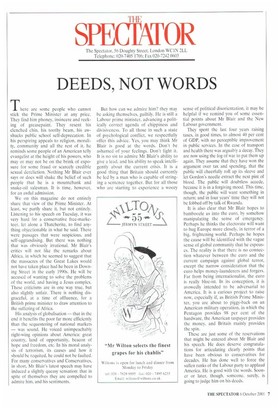DEEDS, NOT WORDS
There are some people who cannot stick the Prime Minister at any price. They find him phoney, insincere and reeking of greasepaint. They resent his clenched chin, his toothy beam, his awshucks public school self-deprecation. In his perspiring appeals to religion, morality, community and all the rest of it, he reminds some people of an American telly evangelist at the height of his powers, who may or may not be on the brink of exposure for some fraud or scarcely credible sexual dereliction. Nothing Mr Blair ever says or does will shake the belief of such people that he is a mountebank and snake-oil salesman. It is time, however, for an awful admission.
We on this magazine do not entirely share that view of the Prime Minister. At least, we partly share it, but not entirely. Listening to his speech on Tuesday, it was very hard for a conservative free-marketeer, let alone a Thatcherite, to find anything objectionable in what he said. There were passages that were suspicious, and self-aggrandising. But there was nothing that was obviously irrational. Mr Blair's critics will not like the remarks about Africa, in which he seemed to suggest that the massacres of the Great Lakes would not have taken place had he been in Downing Street in the early 1990s. He will be accused of wanting to solve the problems of the world, and having a Jesus complex. These criticisms are in one way true, but also slightly unfair. There is nothing disgraceful, at a time of affluence, for a British prime minister to draw attention to the suffering of Africa.
His analysis of globalisation — that in the end it benefits the poor far more efficiently than the sequestering of national markets — was sound. He voiced unimpeachably right-wing opinions about America: great country, land of opportunity, beacon of hope and freedom, etc. In his moral analysis of terrorism, its causes and how it should be requited, he could not be faulted. For many conservatives and Conservatives, in short, Mr Blair's latest speech may have induced a slightly queasy sensation: that in spite of themselves they are compelled to admire him, and his sentiments. But how can we admire him? they may be asking themselves, guiltily. He is still a Labour prime minister, advancing a politically correct agenda of chippiness and divisiveness. To all those in such a state of psychological conflict, we respectfully offer this advice. Yes, you may think Mr Blair is good at the words. Don't be ashamed of your feelings. Don't fight it. It is no sin to admire Mr Blair's ability to give a lead, and his ability to speak intelligently about the current crisis. It is a good thing that Britain should currently be led by a man who is capable of stringing a sentence together. But for all those who arc starting to experience a woozy sense of political disorientation, it may be helpful if we remind you of some essential points about Mr Blair and the New Labour government.
They spent the last four years raising taxes, in good times, to almost 40 per cent of GDP, with no perceptible improvement in public services. In the case of transport and health there was arguably a decay. They are now using the fog of war to put them up again. They assume that they have won the argument over tax and spending, that the public will cheerfully roll up its sleeve and let Gordon's needle extract the next pint of blood. The public will doubtless accede, because it is in a forgiving mood. This time, though, the public will want something in return: and in four years' time they will not be fobbed off by talk of Rwanda.
It is also clear that Mr Blair hopes to bamboozle us into the euro, by somehow manipulating the sense of emergency. Perhaps he thinks the electorate will want to hug Europe more closely, in terror of a big, frightening world. Perhaps he hopes the cause will be identified with the vague sense of global community that he espouses. The reality is that there is no connection whatever between the euro and the current campaign against global terror, except the narrow consideration that the euro helps money-launderers and forgers. Far from being internationalist, the euro is really bloc-ist. In its conception, it is avowedly intended to be adversarial to America. It is a curious project to raise now, especially if, as British Prime Minister, you are about to piggy-back on an American military operation, in which the Pentagon provides 98 per cent of the hardware, the American taxpayer provides the money. and Britain mainly provides the spin.
These are just some of the reservations that might be entered about Mr Blair and his speech. He does deserve congratulations for articulating clearly points that have been obvious to conservatives for decades. He has done well to force the sullen ranks of the Labour party to applaud America. He is good with the words. Sooner or later, though, someone, surely, is going to judge him on his deeds.


































































































 Previous page
Previous page